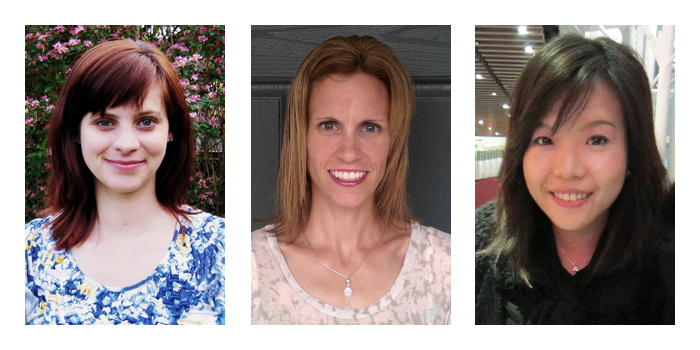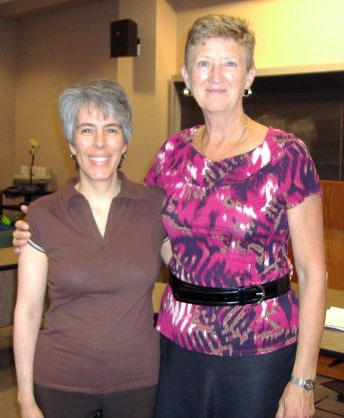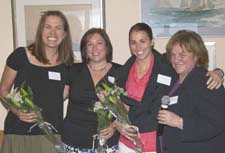On November 26, 2009 over 65 people gathered at the Medical Student Alumni Centre in Vancouver to congratulate recent graduates in the Rehabilitation Science Graduate Programs. Ben Mortensen and Sharon Smith received their Doctor of Philosophy; Jenny Garden, Marylyn Horsman and Helia Sillem received their Master in Science; and Kathy Davidson, Karen Hurtubise, Kathy Hatchard, Twila Mills, Darlene Russell, and Ellie Wray received their Master of Rehabilitation Science.
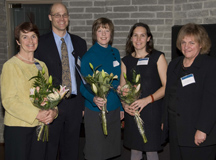
From left to right: Marylyn Horsman, Ben Mortensen, Sharon Smith, Jenny Garden and Lyn Jongbloed. Missing: Helia Sillem
Susan Stanton, Coordinator of the Rehabilitation Science Online Programs was the master of ceremonies for the evening and introduced Dr. Tal Jarus who congratulated the graduates on behalf of the Occupational Science and Occupational Therapy (OS&OT) Department. She warmly reminded them that they weren’t to just hang their degree on the wall and rest. Rather, with their new knowledge and skills, they now had more responsibility. “With a new lense to see the world, you must think critically — ask lots of questions and encourage others to do so as well.”
Dr. Susan Harris congratulated the graduates on behalf of Dr. Jane Garland of the Department of Physical Therapy and highlighted the history of the graduate programs. Since 1993 when the Master of Science program started, the two departments have grown from 120 undergraduate students to 335 graduate students, with the PhD program starting in 2003 and the online Master of Rehabilitation Science program in 2005. Susan has watched the Rehabilitation Science Graduate Programs become enriched due to their interprofessional focus. She explained that learners come from a variety of backgrounds including people living with disability and their supervisors as well.
The present chair of the Rehabilitation Science Research Graduate Programs Dr. Lyn Jongbloed described the event as one which celebrates change and the arrival of new times for the graduates, as they celebrate their achievements and the culmination of academic journeys. She introduced the graduates who had an opportunity to thank their supervisors, many of who were able to attend the event, their families and colleagues. They also chose to say a few words about their journeys. There were common themes of personal growth and a desire to make significant changes to their practice community.
Online Graduates Complete the Evening
Karen Hurtubise delivered the joint valedictorian speech prepared collaboratively and of course, online. Listen to the speech.
She described the gift of comradeship that emerged between the learners, the professors and the advisors, despite the online nature of their communication. “Unique challenges of building a relationship which relies solely on the written word. Despite initially longing to hear voices and see faces, we did establish wonderful relationships with our classmates and instructors. In fact, today, although many of us had not met face-to-face, we greeted each other as long lost friends.”
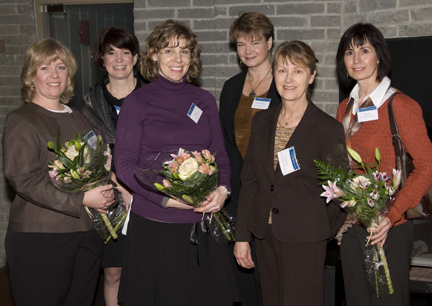
From left to right: Kathy Davidson, Karen Hurtubise, Ellie Wray, Kathy Hatchard, Sue Stanton and Twila Mills. Missing: Darlene Russell
The graduates were explicit in describing the ways in which they had grown while in the program. “We have become analysts and consumers of, and contributors to, the evidence that supports our practice… We have evolved into knowledge translators, skillful advocators, effective educators and evaluators, innovators, visionaries and leaders.”
Recognition and warm thanks were extended to their research supervisors, employers, agency sponsors, instructors and program staff who supported their research projects and academic journeys. “Thank you for believing in us and our ideas and commitment to bettering the services we deliver.”
Read the MRSc graduates’ research abstract on our program website.
